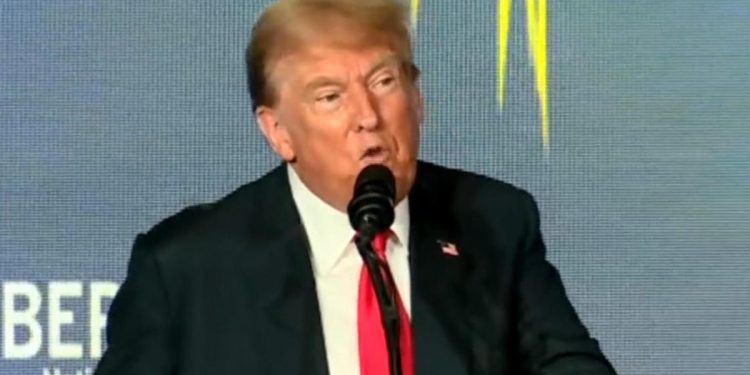Attorneys for former President Donald Trump pushed back on Monday evening against special counsel Jack Smith’s request Friday for a federal judge in Florida to amend Trump’s release terms in the investigation into his handling of secret documents.
Federal prosecutors have asked U.S. District Judge Aileen Cannon, who is overseeing the documents case, to modify Trump’s release conditions to prohibit him from making public statements that “pose a significant, imminent, and foreseeable danger to law enforcement agents” involved in the prosecution.
Prosecutors told Cannon, the president’s appointed judge, “Trump’s repeated mischaracterization of these facts in widely distributed messages as an attempt to kill him, his family, and Secret Service agents has endangered law enforcement officers involved in the investigation and prosecution of this case and threatened the integrity of these proceedings.”
“A restriction prohibiting future similar statements does not restrict legitimate speech,” they stated.
Trump falsely claimed last week that the FBI officers who searched his Mar-a-Lago estate in August 2022 had “authorization to shoot me” and were “locked and loaded, ready to take me out and put my family in danger,” prompting the special counsel’s request to Cannon.
Trump was referring to a disclosure in a court document that the FBI used a standard use-of-force policy during that search, which prohibits the use of deadly force unless the officer conducting the search has a reasonable belief that the “subject of such force poses an imminent danger of death or serious physical injury to the officer or to another person.”
The policy is routine and aims to reduce the use of force during searches. Prosecutors stated that they purposefully carried out the search when Trump and his family were away, coordinating with the Secret Service. No force was applied.
Prosecutors on special counsel Jack Smith’s team said in a court filing late Friday that Trump’s misleading statements claiming that federal agents “were complicit in a plot to assassinate him” would expose law enforcement officials “to the risk of threats, violence, and harassment.” We anticipate some of them to testify in Trump’s trial.
However, Trump’s attorneys on Monday termed Smith’s request “extraordinary, unprecedented, and unconstitutional censorship” and stated in their brief that “the motion unjustly targets President Trump’s campaign speech while he is the leading candidate for the presidency.”
They say that Smith’s petition goes beyond any previous requests made by any other prosecutor in the former president’s cases because it links Trump’s freedom to his campaign statements.
The former president also claims that prosecutors breached local norms by neglecting to properly “confer” with them prior to filing the motion. Trump’s lawyers claimed that Smith’s team failed to provide a reasonable conferral period by filing the motion late on a holiday Friday, ahead of closing arguments this week in the separate New York “hush money” criminal case against Trump, as required by local rules in the Southern District of Florida. As exhibits, Trump’s lawyers presented email correspondence between the parties from Friday night.
Trump reportedly requested that Cannon discipline the Justice Department’s legal team for allegedly breaking local norms.
Earlier this week, Attorney General Merrick Garland described Trump’s allegation as “extremely dangerous.” Garland clarified that Trump was referring to a common protocol limiting the use of force, which also served as a basis for a consensual search of President Joe Biden’s house during an investigation into the Democrat’s handling of secret information.
Trump faces dozens of felony counts for illegally keeping confidential papers at his Mar-a-Lago home in Palm Beach, Florida, after leaving the White House in 2021 and then hindering the FBI’s efforts to recover them. He has pleaded not guilty and denies any misconduct.
It’s one of four criminal prosecutions Trump is facing as he bids to recapture the White House, but aside from the continuing New York hush money prosecution, it’s unclear whether any of the other three will get to trial before the election.










